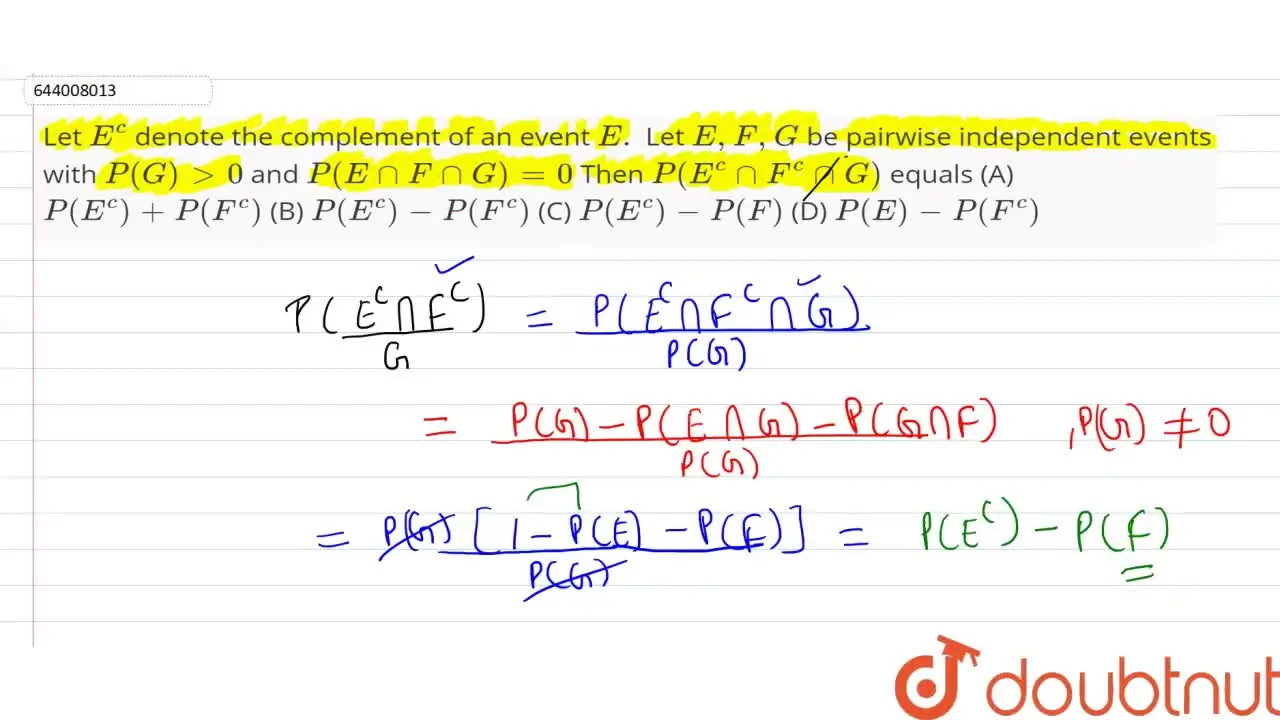Let Ec denote the complement of an event E. Let E,F,G be pairwise independent events with P(G)>0 and P(E∩F∩G)=0 Then P(Ec∩Fc∩G) equals (A) P(Ec)+P(Fc) (B) P(Ec)−P(Fc) (C) P(Ec)−P(F) (D) P(E)−P(Fc)
P(Ec)+P(Fc)
P(Ec)−P(Fc)
P(Ec)−P(F)
P€-P(F^c)
The correct Answer is:C
Step by step video & image solution for Let E^c denote the complement of an event E. Let E,F,G be pairwise independent events with P(G) gt 0 and P(E nn F nn G)=0 Then P(E^c nn F^c nn G) equals (A) P(E^c)+P(F^c) (B) P(E^c)-P(F^c) (C) P(E^c)-P(F) (D) P(E)-P(F^c) by Maths experts to help you in doubts & scoring excellent marks in Class 12 exams.
Related Playlists
- BOOK - ARIHANT MATHS ENGLISHCHAPTER - PROBABILITYEXERCISE - Exercise (Subjective Type Questions)15videos
PROBABILITY
- BOOK - ARIHANT MATHS ENGLISHCHAPTER - PERMUTATIONS AND COMBINATIONS EXERCISE - Exercise (Questions Asked In Previous 13 Years Exam)28videos
PERMUTATIONS AND COMBINATIONS
- BOOK - ARIHANT MATHS ENGLISHCHAPTER - PRODUCT OF VECTORSEXERCISE - Exercise (Questions Asked In Previous 13 Years Exam)51videos
PRODUCT OF VECTORS
Similar Questions
Let A, B, C be pariwise independent events with P(C)>0andP(A∩B∩C)=0. Then P(Ac∩BcC).
View SolutionIf E and F are independent events, then write P(E∪F)
View SolutionIf E and F are independent events such that 0<P(E)<1and 0<P(F)<1, then
View SolutionIf E' denote the complement of an event E , what is the value of P(E')+P(E)?
View SolutionTwo events E and F are independent. If P(E )=0.3 and P(E∪F)=0.5 then P(E/F)−P(F/E) equals to
View SolutionTwo events E and F are independent. If P(E )=0.3 and P(E∪F)=0.5 then P(E/F)−P(F/E) equals to
View SolutionIf E and F are two independent events and P(E)=13,P(F)=14, then find P(E∪F).
View SolutionIf E and E2 are independent events, write the value of P(E1∪E2)∩(Ec1∩Ec2).
View SolutionLet E and F be events with P(E)=35, P(F)=310and P(E∩F)=15. Are E and F independent?
View SolutionLet E and F be events with P(E)=35, P(F)=310and P(E∩F)=15. Are E and F independent?
View Solution


